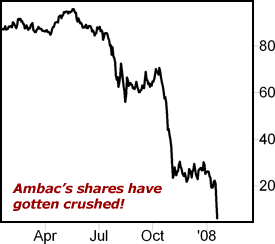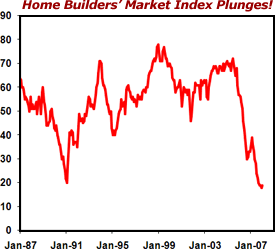Financial Sector Crash Continues with Gigantic Bad Debt Write-downs
Stock-Markets / Banking Stocks Jan 19, 2008 - 01:24 AM GMT Mike Larson writes: The stock market is in a state of near-panic. The Dow tanked another 307 points yesterday, continuing a string of triple-digit declines that have marred the new year. The latest action is proof positive that the credit problems that began in the housing and home mortgage market are spreading out in concentric circles.
Mike Larson writes: The stock market is in a state of near-panic. The Dow tanked another 307 points yesterday, continuing a string of triple-digit declines that have marred the new year. The latest action is proof positive that the credit problems that began in the housing and home mortgage market are spreading out in concentric circles.
They're forcing builders to cut back furiously on home construction. They're causing companies to slash jobs. They're weakening the broader economy, helping drive losses on credit cards, auto loans, and other products higher.
And nowhere is the impact as severe as the U.S. financial sector. Banks and brokers are spilling so much red ink that it's hard to keep up with it all!
If you want to make sound investment decisions in 2008, understanding these figures is critically important.
The markets are crumbling and we've got no time to waste, so let's get right into the big-picture trends that are jumping right off the pages ...
Gigantic Write-downs Continue To Imperil the Financial Sector!
From regional banks to the financial behemoths, firms are owning up to huge losses.
Much of the carnage is coming from home mortgages and so-called "structured finance" deals. One major culprit — the once-ballyhooed Collateralized Debt Obligations (CDOs), a form of fixed-income security that invests in slices of other packaged loans — bundles of mortgages, auto loans, corporate debt, and so on.
These caustic investments are now showing up in press release after press release ...
The Bank of New York Mellon (BK) wrote down its CDOs by $118 million ...
M&T Bank (MTB) announced a $127 million CDO charge ...
Merrill Lynch (MER) reported a stunning $11.5 billion in fourth-quarter charges tied to CDOs. Merrill's total quarterly loss was $9.83 billion versus a profit of $2.35 billion a year earlier ...
And Citigroup (C) won the blue ribbon, taking an eye-popping $18 billion charge. That helped drive the firm deep into the red — it lost $9.83 billion in the quarter versus a profit of $5.1 billion a year earlier.
Here's another crucial NEW development that you need to know about: Many of these firms have insured the value of their CDOs and other holdings by entering into "credit insurance" policies with certain counterparties.
Think of these like you would any insurance policy. As a homeowner, you buy homeowners' insurance to protect yourself against the risk your house will burn down. Well, financial firms can also buy credit insurance — insurance that ostensibly protects their portfolios against losses if the bonds or other securities they're holding go into default.
There's just one problem: Some of the parties who SOLD those credit insurance policies are facing huge financial difficulties. Martin has talked about Ambac, MBIA, and the others before.

Since then, the prices of their own shares and debt securities have continued to plunge. The reason: So many CDOs and other securities are going into default, or threatening to do so down the road, that investors are worried the losses will swamp the insurers. In simple terms, they're worried the insurers won't be able to make good on the policies they sold.
And that could spark a whole new round of mega-writedowns and charges. Indeed, Merrill Lynch took a $2.6-billion hit because one of its insurers, ACA Capital Holdings, is under severe financial pressure. It wrote off its ACA-provided coverage as worthless.
Meanwhile, Credit Losses Are Rising Fast on All Kinds of Loans
It's not just mark-to-market hits on the value of esoteric debt securities plaguing the financial sector.
Let's be honest: Big financial firms take big market risks all the time, and sometimes they get burned. Investors are able to ignore these events.
But now these companies are also seeing their bread and butter underlying loans go sour at a rapid pace. I'm not just talking about home mortgages, either.
For example, Citigroup said credit costs in the U.S. consumer business surged $4.1 billion. That number included a charge of $3.31 billion to boost the bank's loan loss reserve due to rising delinquencies on first and second mortgages, as well as personal loans, credit cards, and car loans .
What about JPMorgan? The firm's retail banking division boosted its provision for credit losses to $1.05 billion from $262 million a year earlier. That's a fourfold increase , only part of which was driven by problems in the home equity and mortgage arena.
And I don't know if you saw it, but the Wall Street Journal had a great story this week about a "sudden acceleration in auto loan delinquencies." It said some 2.06% of prime-credit auto loans made in 2006 are already more than 30-days delinquent.
That's a higher level of early defaults than we saw in 2001, when the economy was last in recession!
Loans made in 2007 are performing even worse, a sign that auto lenders went too far out on the risk curve just like their mortgage lender brethren.
Also noteworthy: It used to be the homeowners who were having credit problems with individual mortgages. Now home and condo DEVELOPERS are starting to have problems paying off their loans.
Look at it this way: If you're a banker and one of your customers can't pay his $300,000 mortgage, that's bad. But if you're a banker and one of the builders you've lent money to can't pay his $300 MILLION development loan, the losses can be exponentially larger!
Make No Mistake: Housing Remains Weak And Commercial Real Estate Is Slowing
December was a particularly nasty month for the construction industry. Housing starts were off by more than 14% on the month ... 38% on the year ... and 56% from the market peak.
We haven't seen this little construction activity since March 1991!
Permits, for their part, dropped 8.1% on the month ... 34.4% on the year ... and a whopping 52.8% from their peak.
The decline was geographically widespread, too. Construction fell in all four regions, while permit activity fell in three out of four.

Separately, an index that measures builder optimism, current sales trends, and buyer traffic remains in the dumps. At 19, the index is just off December's reading of 18, which was the lowest level since the National Association of Home Builders began its survey in 1985.
Clearly, builders are still under immense pressure. More bankruptcies could be coming soon. The Federal Reserve's latest "Beige Book" — which contains anecdotal evidence on the economy collected from contacts around the U.S. — also noted that commercial construction activity was slowing and that rental growth rates are slumping.
That's exactly what I've been warning you about for several quarters, and it confirms my suspicion that a surge in commercial real estate loan delinquencies is coming next.
This Means the Broad Market and The Economy Are in Dire Straits
The financials are the heart of our economy. They finance our debt-driven society. And right now, they're gushing red ink.
They've already been tightening loan standards, and cutting back on new lending so they can repair their balance sheets. But if these losses persist — or get worse as the economy slumps — you're going to see credit get even tighter.
That's bearish for the market, no matter how you slice it.
So NOW is the time to get even more cautious, in my view. Jettison some losers and take some more gains off the table on winners. Build more cash reserves and take a conservative approach to spending. That's the best way to protect yourself — and your portfolio — from the continued weakness that we're going to experience.
Until next time,
Mike
This investment news is brought to you by Money and Markets . Money and Markets is a free daily investment newsletter from Martin D. Weiss and Weiss Research analysts offering the latest investing news and financial insights for the stock market, including tips and advice on investing in gold, energy and oil. Dr. Weiss is a leader in the fields of investing, interest rates, financial safety and economic forecasting. To view archives or subscribe, visit http://www.moneyandmarkets.com .
Money and Markets Archive |
© 2005-2022 http://www.MarketOracle.co.uk - The Market Oracle is a FREE Daily Financial Markets Analysis & Forecasting online publication.



